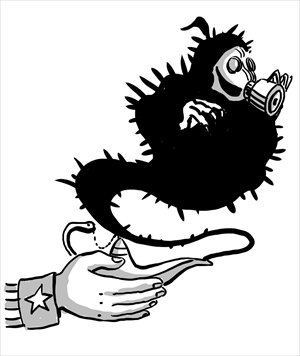US seeks to arm Syrian rebels through repeating chemical weapons fairy tale

On June 13, the US announced that Syria had deployed chemical weapons including the sarin nerve agent. US Deputy National Security Advisor for Strategic Communications Ben Rhodes outlined the data on which the accusation was based.
This assessment was then shadowed by a US pledge to arm Syria-based militants.
Online analysts, in the days and weeks preceding the White House accusation, noted an increase in new and advanced weaponry in the hands of insurgents. Indeed, the Washington Post reported on June 15 that the decision to arm militants was made weeks ago and that its assessment merely provided "fresh justification."
Memories of the US case for invading Iraq cast considerable doubt over the latest of several charges against the Syrian government.
An examination of the data referenced by Rhodes points to an incident in the Aleppo district of Sheikh Maqsoud in April of this year.
The Britain-based Syrian Observatory for Human Rights, in a Facebook statement, reported a dawn attack on the area in which helicopters were used to drop bombs containing poisonous gases. The scene, photographed after the alleged incident, shows a small cylindrical device allegedly used to disperse the gas.
Just weeks after these videos, a photograph surfaced showing a Jabhat al-Nusra militant in the town of Ras al-Ayn, in Syria's Al-Hasakah Province.
The militant has attached to his military assault vest the same type of device allegedly used by the Syrian government to deploy chemical weapons.
Despite the existence of the photograph, the US maintains that it has "no reliable, corroborated reporting to indicate that the opposition in Syria has acquired or used chemical weapons."
Recent developments also cast overwhelming doubt on the White House's assertion.
On May 27, Turkish newspapers reported a dawn raid on a suspected Al Qaeda cell in the southern Turkish city of Adana. The raid uncovered a cache which included two kilograms of the sarin nerve agent.
On June 1, just 12 days before the White House statement which leveled accusations against the Syrian government on the use of chemical weapons, the Iraqi Ministry of Defense announced that it had busted an Al Qaeda cell operating a chemical weapons factory. The five-man cell had been under surveillance for three months and according to testimonies, intended to use sarin and mustard gas inside Iraq and in neighboring countries.
Carla Del Ponte, lead investigator in the United Nations Independent Commission of Inquiry, said in a statement in early May, "This was used on the part of the opposition, the rebels, not by the government authorities."
Having come just one week after the Syrian army's victory in the strategic Homs town of Al-Qusayr, the timing of the US accusations is significant.
Several tons of weapons delivered to insurgents sometime last year have seemingly failed to stem advances by Syrian troops across the country.
With increases in atrocities by international insurgents, widely reported as rebels by international media, justification for further arms transfers to militant groups is made more difficult.
In the last week of May, a Christian village in Homs reportedly had its population massacred by insurgents apparently seeking revenge for its losses in Al-Qusayr.
Musa al-Gharbi, research fellow at the US-based Southwest Initiative for the Study of Mideast Conflict, described the renewed accusations as a "transparent fabrication."
Al-Gharbi said, "The only countries to find this evidence compelling are those who have an expressed interest in intervening on behalf of the rebels: Qatar, Saudi Arabia, Israel, Britain and France."
On June 14, citing US officials, the Washington Post reported that the decision to arm militants had been made weeks before.
Despite the lack of clarity around the extent of US support, its allegations have given a green light to Gulf states such as Saudi Arabia to flood Syria with weapons.
Reports of kidnappings and beheadings are on the rise. Al-Gharbi, commenting on the US decision to arm militants in Syria, said, "The policy of arming the rebels, which was based on a transparent fabrication of chemical weapons use on the part of the regime, is the precise formula to render negotiations impossible."
The lifespan of the conflict has undoubtedly been extended, delivering a striking blow to the insistence of Russia and China for a commitment to dialogue.
The author is a freelance journalist based in Meath, Ireland. opinion@globaltimes.com.cn